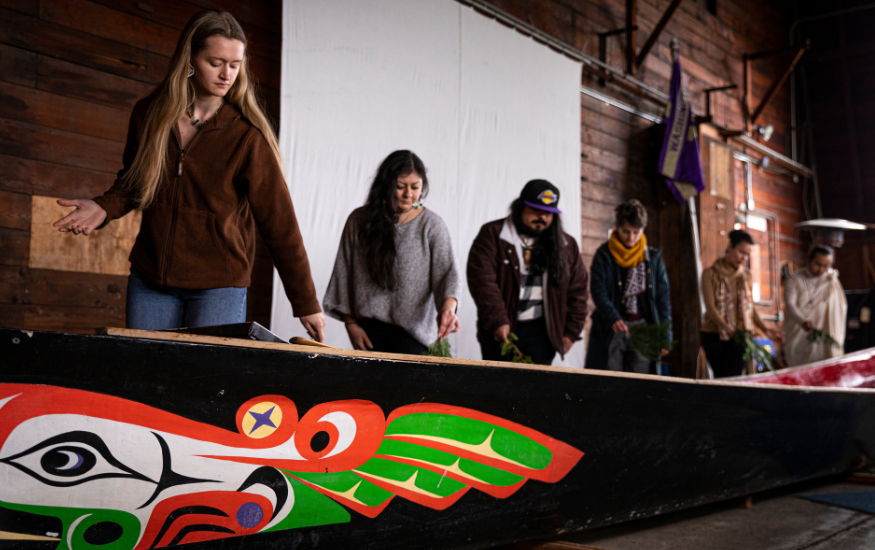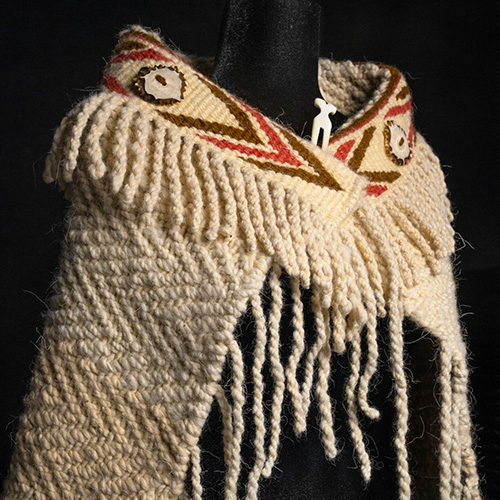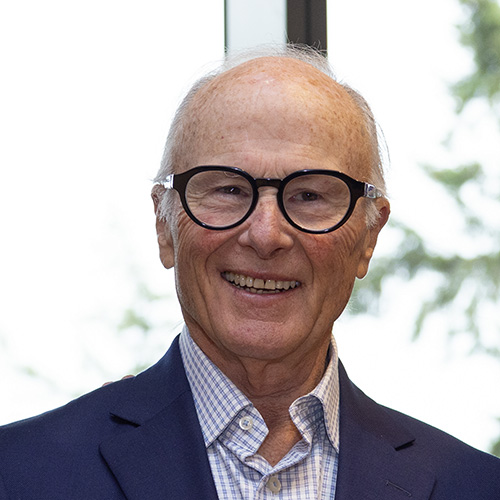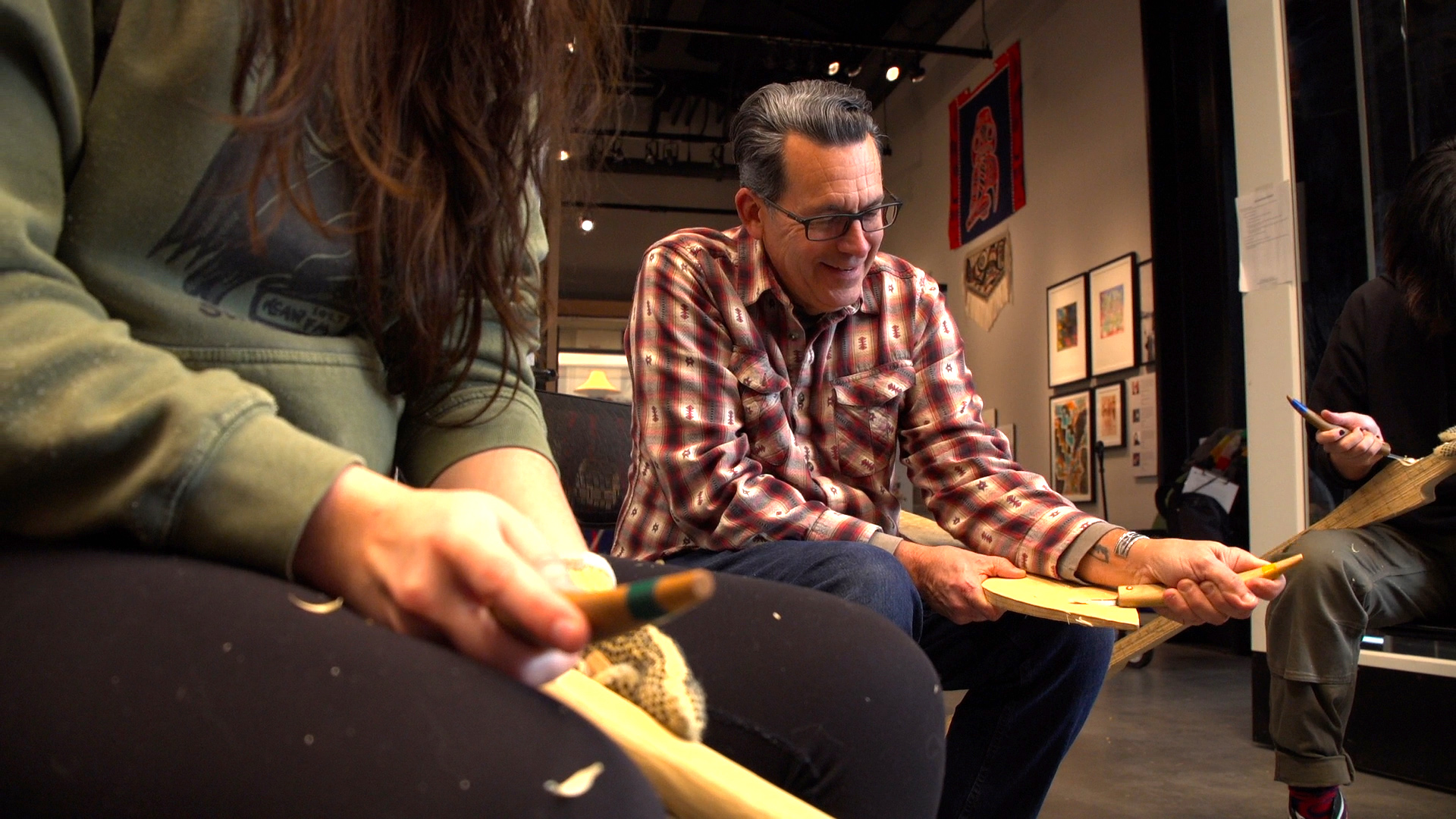
With a 2.3 million Mellon Foundation grant renewal, the UW’s Center for American Indian & Indigenous Studies continues to dream itself forward.
“We get to say, ‘Yes, what you are doing is amazing, please do more of that,’” says Jean Dennison, UW associate professor of American Indian Studies and co-director of the Center for American Indian & Indigenous Studies (CAIIS). “We’re fundamentally intervening and creating spaces of possibility.”
The Center grew out of many shared meals and discussions about what kinds of support American Indian and Indigenous faculty, staff, and students at the UW need. Todd Clark, CAIIS program manager, describes how regional tribal nations answered that question. “They asked us to take care of their students,” he says. “Once the students realize they are supported by their community, we can dive into things like incorporating Native knowledges into their research. But first, students need foundational support.”
This feedback and more led to a vision and a $1.82 million Pathways and Partnerships grant from the Mellon Foundation, awarded in 2019. Since then, with additional funding from the UW College of Arts and Sciences, Office of the Provost, and 15 other units across all three UW campuses, the Center has been busy. The work involves creating pathways for Native students into and through the UW, providing supportive connections for students and faculty, building partnerships across the UW campuses and with regional two-year colleges, and facilitating essential partnerships and connections with regional tribal Nations and Indigenous people.
Interrelated Progress
Five years in, it’s hard to imagine more progress, even considering the setbacks of a global pandemic. Cohort-based programming includes “knowledge families,” such as the Indigenous Food Family, which connect students with Indigenous knowledge and land-based practices. Community Leader Marylin Oliver-Bard has been working since 2018 to establish a UW Canoe Family with Willapa Spirit, the canoe she commissioned for her father and Canoe Journey founder Emmett Oliver. Under the leadership of Oliver-Bard and Native Knowledge Coordinator Philip Red Eagle, CAIIS has brought together several of its programs to make this vision happen including the Native UW Scholars Program (NUW), a Native Knowledge lecturer grant for Suquamish skipper Nigel Lawrence, and a Summer Institute in Indigenous Humanities with Southern Lushootseed Teaching Professor Tami Hohn. UW faculty, staff, students, and alumni have joined in this effort through carving, paddling, learning from local area tribes, and planning for this summer’s Tribal Canoe Journey. In addition, supportive summer training, events, guest speakers, and funding for research and professional development — for students, staff and faculty — all build toward long-term networks in community.

“Our University is deeply grateful to the American Indian and Indigenous communities at the UW for leading this work and to the Mellon Foundation for investing in our Native students’ success,” said UW President Ana Mari Cauce. “The Center represents vital progress and I’m excited for what’s to come.”
This momentum to support Indigenous knowledges and peoples across the UW extends beyond the Center with Native representation in places like the governor-appointed UW Board of Regents and a partnership between UW’s inaugural Director of Tribal Relations and the Office of Minority Affairs and Diversity (OMAD) to complete the fully-funded second phase of wǝɫǝbʔaltxw – Intellectual House. Tuition waivers for American Indian students are becoming a higher priority in the state legislature and additional staff members in OMAD will support more students, faculty, and staff.
“It feels like a seismic change to be at UW with all this going on,” says Dennison. “It all works together in ways you don’t expect. There are all kinds of connections.”
Fifth-year graduate student and CAIIS Board Member Alika Bourgette describes seeing the ecosystem come to life around him. “When I started, it was a little bit more of a disparate push, with a couple of graduate students working in a research cluster alongside faculty,” he says. “Then, in my second year, there was a rapid succession of changes, where a graduate certificate kicked off, and the opportunity to participate in foundational classes, and then seeing this centralized hub where we get exposed to other disciplines and professors.”
He talks about the overall impact of CAIIS, including his canoeing experiences. “Being invited into CAIIS from the beginning not only improves academic outcomes, but it also improves our well-being,” he says, “These experiences, making sure I understood this is a home for Pacific Islanders, gave me roots in a place where they didn’t exist.”
Our University is deeply grateful to the American Indian and Indigenous communities at the UW for leading this work and to the Mellon Foundation for investing in our Native students’ success.
Momentum in Community
The CAIIS community has many plans for the next five years, with the renewed $2.3 million grant from the Mellon Foundation and continued support from the UW Office of the Provost, Board of Deans and Chancellors, and expanded financial support from the College of Arts and Sciences.
“This Center serves as an essential community and intellectual anchor in the rich ecosystem of American Indian Studies at the UW,” says Dean of Arts and Sciences Dianne Harris. “Along with a recent series of AIS faculty hires in the College, and plans to construct the second phase of wǝɫǝbʔaltxw, Jean Dennison and her colleagues are creating through their work in the Center the most welcoming environment possible for Native students, staff, and faculty — one that sits at the leading edge of scholarship and community practice in the field and is recognized as a national exemplar.”

This new Mellon funding will allow the Center to develop more programming on the UW-Tacoma campus (UW-Tacoma article: New Grant Will Expand Access to Native Knowledge), welcome more first-year students in the cohort-based programs, develop more transfer pathways, provide summer training and long-term networks for more undergraduates and graduate students, and continue to support Native knowledge across the three UW campuses. The work feeds on itself with many students staying involved and becoming mentors.
Dennison makes the point that nourishing people is what the Center’s work is all about. “I was raised to always feed people,” she says. In the same way, adequate support to sustain this effort beyond the current funding cycle is one of the most important aspects of honoring the people, grants, and work done so far. As Dennison looks toward the future, she sees the need for more people capacity and most importantly a dedicated space for the Center’s activities. She is also excited to welcome a new co-director from the UW-Bothell campus next year who will develop programming to suit their unique needs.
Dennison also points out that building relationships and trust is more the work of decades than years and credits the 50-year history of American Indian Studies at the UW with laying the groundwork for the Center’s existence. “The College of Arts and Sciences has put a great deal of investment into American Indian and Indigenous studies,” says Dennison. “There’s a tipping point when you get enough Native faculty doing enough different kinds of work. The Burke Museum is also a huge partner. Because of those investments and connections, so much is possible.”
“The Center’s growth and success demonstrates how long-term and sustained efforts of recruiting and retaining an inclusive faculty spur transformative change both for the university and for its community partners,” says Chadwick Allen, associate vice provost for faculty advancement and a founding CAIIS co-director.
For example, in May the UW School of Social Work’s Indigenous Wellness Research Institute asked Dennison to help them host 17 visiting Māori scholars. She connected with the Burke Museum, and Burke curator Dr. Sven Haakanson organized a tour, after which the visitors met with students from CAIIS’s Pacific Islander knowledge family. “They went through the collections with students, celebrating and caring for their relatives housed at the Burke,” Dennison says. “They also talked about what needed to come home. It showed how research and collections don’t have to feel extractive and can take many forms.” CAIIS then invited them all down to the ASUW Shell House to share a meal with Native students and the American Indian Studies canoe class.
“We connected the Māori scholars with the canoe class and its Suquamish instructor Nigel Lawrence, who was hosting UW Regent and Chairman of the Suquamish Tribe Leonard Forsman as a guest speaker for the day,” says Dennison. “It turns out Māori folks helped bring canoe building back to the Suquamish and the guest speakers took time to thank the Māori guests for carrying and sharing that knowledge. This is the concept of the ecosystem — it’s alive and works in ways you don’t expect, elevating everyone.”
Related Stories:
New Grant will Expand Access to Native Knowledge, University of Washington | Tacoma
Awakening the Canoe: UW Canoe Family Prepares for this Summer's Tribal Canoe Journey, UW News
Using hand tools to shape the wood, students – mostly University of Washington undergraduates, as well as a few alumni, faculty and staff – have been carving traditional Coast Salish canoe paddles from yellow cedar during weekly sessions at the Burke Museum under the guidance of Philip H. Red Eagle (Salish/Dakota). Red Eagle, who was instrumental in continuing the tradition of the Tribal Canoe Journeys, is the Native knowledge-in-residence coordinator for the UW Center for American Indian and Indigenous Studies. The paddles are for the Willapa Spirit canoe with plans for the UW Canoe Family to participate in this summer's Tribal Canoe Journey.
More Stories

A Healing Heart Returns
In February, the UW Symphony will perform a symphony that Coast Salish elder Vi Hilbert commissioned years ago to heal the world after the heartbreak of 9/11. The symphony was first performed by the Seattle Symphony in 2006.

Coast Salish Traditions are "Woven in Wool" at the Burke
A Burke Museum exhibit, co-curated by Coast Salish weavers and Burke curators, highlights the importance of weaving to Coast Salish communities.

A Transformative Gift for Arts & Sciences
To honor his wife and support the college that has meant so much to both of them, former Arts & Sciences dean John Simpson created the Katherine and John Simpson Endowed Deanship.

